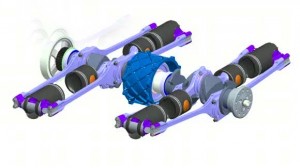
A report from the National Petroleum Council says that the internal combustion engine will continue to power the majority of cars in the U.S. for the foreseeable future. But EcoMotors is developing a new engine called OPOC that could improve internal combustion engine efficiency.
Even though automakers and the government are pouring billions of research dollars into alternatives, a new report predicts that petroleum will continue to dominate the automotive market for decades to come unless a disruptive innovation is introduced.
But natural gas has the potential to assume a large chunk U.S. transportation, particularly in large vehicles such as buses and refuse haulers.
The report, titled Advancing Technology for America’s Transportation Future, predicts a future that will continue to be dominated by petroleum, but supplemented by a variety of technologies including electricity, hydrogen and biofuels.
But the report authors acknowledge that technological innovations could provide a replacement for petroleum.
“Profound changes are possible with disruptive, yet highly uncertain, innovations such as ultra-light-weight vehicle materials; new electric vehicle battery technologies; low-cost, low-pressure storage for natural gas or hydrogen; or breakthroughs yielding lower cost, low carbon transportation fuel,” the report says.
What isn’t known is what disruptive technologies may become available.
Click here to view a summary of the report.
U.S. Energy Secretary Steven Chu requested the report in 2009, asking the council to study alternative-fuel vehicle systems to help improve fuel efficiency, lower greenhouse-gas emissions and reduce oil imports. He was briefed on the report Wednesday but has not issued a statement.
But while the Obama administration continues to push for new technologies to replace petroleum, it would appear that the internal combustion engine – in use since the very beginning of the auto industry – will be used for years to come.
The report authors, including representatives of the transportation industry, government and universities recommended that the government adopt an “technology-neutral” stance and allow market forces to determine winners and losers in the race to replace or supplement petroleum.
The report took two years and nearly 300 contributors to produce.
